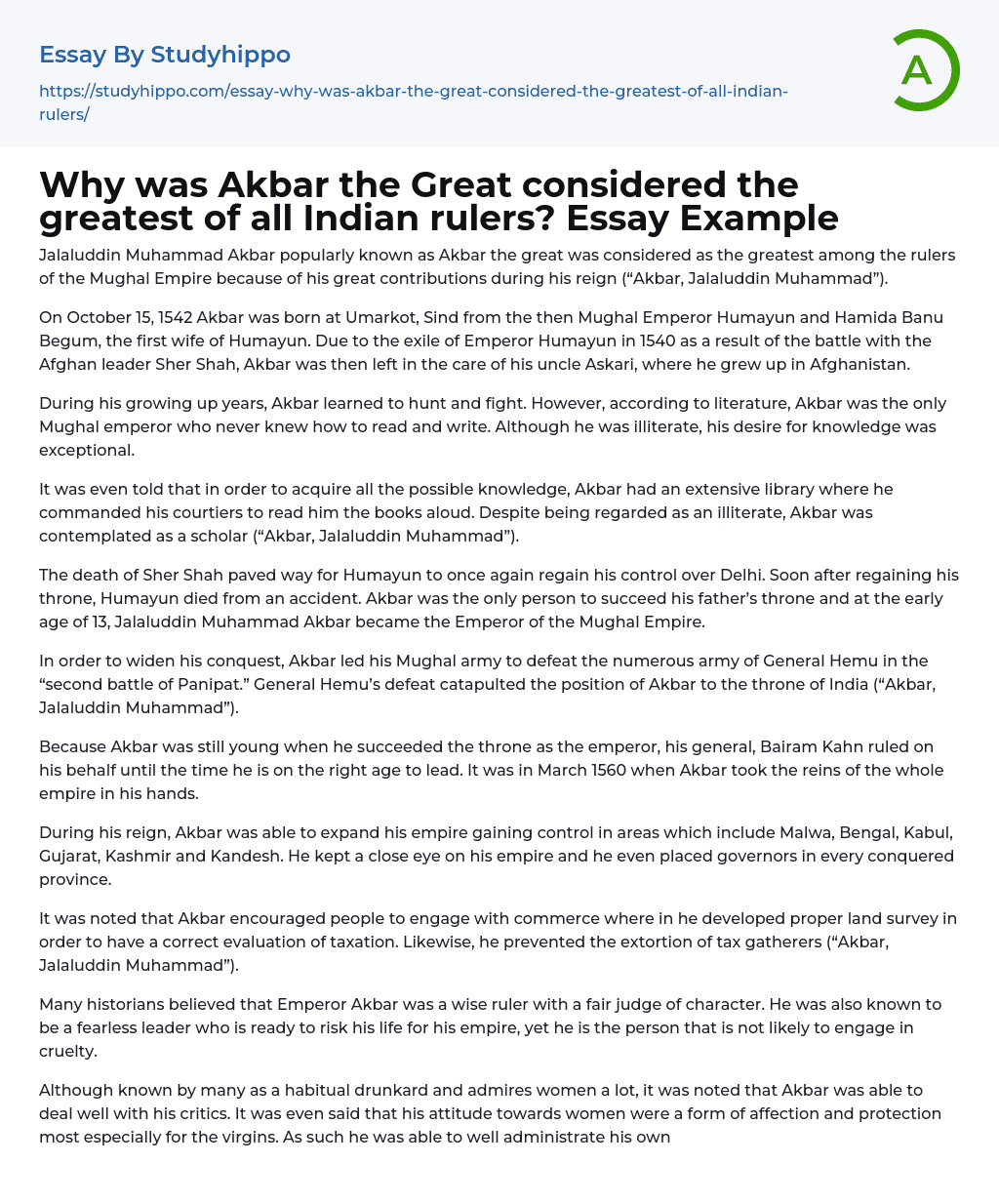

Why was Akbar the Great considered the greatest of all Indian rulers? Essay Example
Jalaluddin Muhammad Akbar popularly known as Akbar the great was considered as the greatest among the rulers of the Mughal Empire because of his great contributions during his reign (“Akbar, Jalaluddin Muhammad”).
On October 15, 1542 Akbar was born at Umarkot, Sind from the then Mughal Emperor Humayun and Hamida Banu Begum, the first wife of Humayun. Due to the exile of Emperor Humayun in 1540 as a result of the battle with the Afghan leader Sher Shah, Akbar was then left in the care of his uncle Askari, where he grew up in Afghanistan.
During his growing up years, Akbar learned to hunt and fight. However, according to literature, Akbar was the only Mughal emperor who never knew how to read and write. Although he was illiterate, his desire for know
...ledge was exceptional.
It was even told that in order to acquire all the possible knowledge, Akbar had an extensive library where he commanded his courtiers to read him the books aloud. Despite being regarded as an illiterate, Akbar was contemplated as a scholar (“Akbar, Jalaluddin Muhammad”).
The death of Sher Shah paved way for Humayun to once again regain his control over Delhi. Soon after regaining his throne, Humayun died from an accident. Akbar was the only person to succeed his father’s throne and at the early age of 13, Jalaluddin Muhammad Akbar became the Emperor of the Mughal Empire.
In order to widen his conquest, Akbar led his Mughal army to defeat the numerous army of General Hemu in the “second battle of Panipat.” General Hemu’s defeat catapulted the position of Akbar t
the throne of India (“Akbar, Jalaluddin Muhammad”).
Because Akbar was still young when he succeeded the throne as the emperor, his general, Bairam Kahn ruled on his behalf until the time he is on the right age to lead. It was in March 1560 when Akbar took the reins of the whole empire in his hands.
During his reign, Akbar was able to expand his empire gaining control in areas which include Malwa, Bengal, Kabul, Gujarat, Kashmir and Kandesh. He kept a close eye on his empire and he even placed governors in every conquered province.
It was noted that Akbar encouraged people to engage with commerce where in he developed proper land survey in order to have a correct evaluation of taxation. Likewise, he prevented the extortion of tax gatherers (“Akbar, Jalaluddin Muhammad”).
Many historians believed that Emperor Akbar was a wise ruler with a fair judge of character. He was also known to be a fearless leader who is ready to risk his life for his empire, yet he is the person that is not likely to engage in cruelty.
Although known by many as a habitual drunkard and admires women a lot, it was noted that Akbar was able to deal well with his critics. It was even said that his attitude towards women were a form of affection and protection most especially for the virgins. As such he was able to well administrate his own affairs (“Akbar, Jalaluddin Muhammad”).
The difference in the beliefs of the Hindu and Islamic faith is the very reason why both religions are separated. However, it is important to note
that during the reign of Akbar, the Mughal Empire consist of both Hindus and Muslims.
Most of the citizens under Akbar’s empire were Hindus while the high positions in the empire were exclusive for the Muslims. Despite the polarization, Akbar managed to promote religious tolerance and put in effect the universal toleration. Aside from appointing Hindus in high positions, distinctions between Muslims and non-Muslims were also removed.
In addition, he dissolved the pilgrim tax and the jizya tax among the non-Muslim citizens. He also build a trusting relationship with the Catholic Church, and came up with a building called the Ibadat Khana where religious debate is practiced by different people of different religions (“Akbar, Jalaluddin Muhammad”).
- Quran essays
- Al-Qaeda essays
- Muhammad essays
- Muslim essays
- Ali essays
- Ramadan essays
- Bangladesh essays
- China essays
- Hong Kong essays
- India essays
- Japan essays
- Kuala Lumpur essays
- Malaysia essays
- Manila essays
- Pakistan essays
- Philippines essays
- Singapore essays
- Vietnam essays
- Vietnamese essays
- Afterlife essays
- Atheism essays
- Bible essays
- Buddhism essays
- Christian Worldview essays
- Christianity essays
- Confession essays
- Cosmological Argument essays
- Deism essays
- Devil essays
- Existence of God essays
- Faith essays
- Freedom Of Religion essays
- God essays
- Hinduism essays
- Immortality essays
- Islam essays
- Jainism essays
- Jews essays
- Judaism essays
- Miracle essays
- Monk essays
- Monotheism essays
- New Testament essays
- Old Testament essays
- Pilgrimage essays
- Puritans essays
- Revelation essays
- Ritual essays
- Salvation essays
- Sin essays



